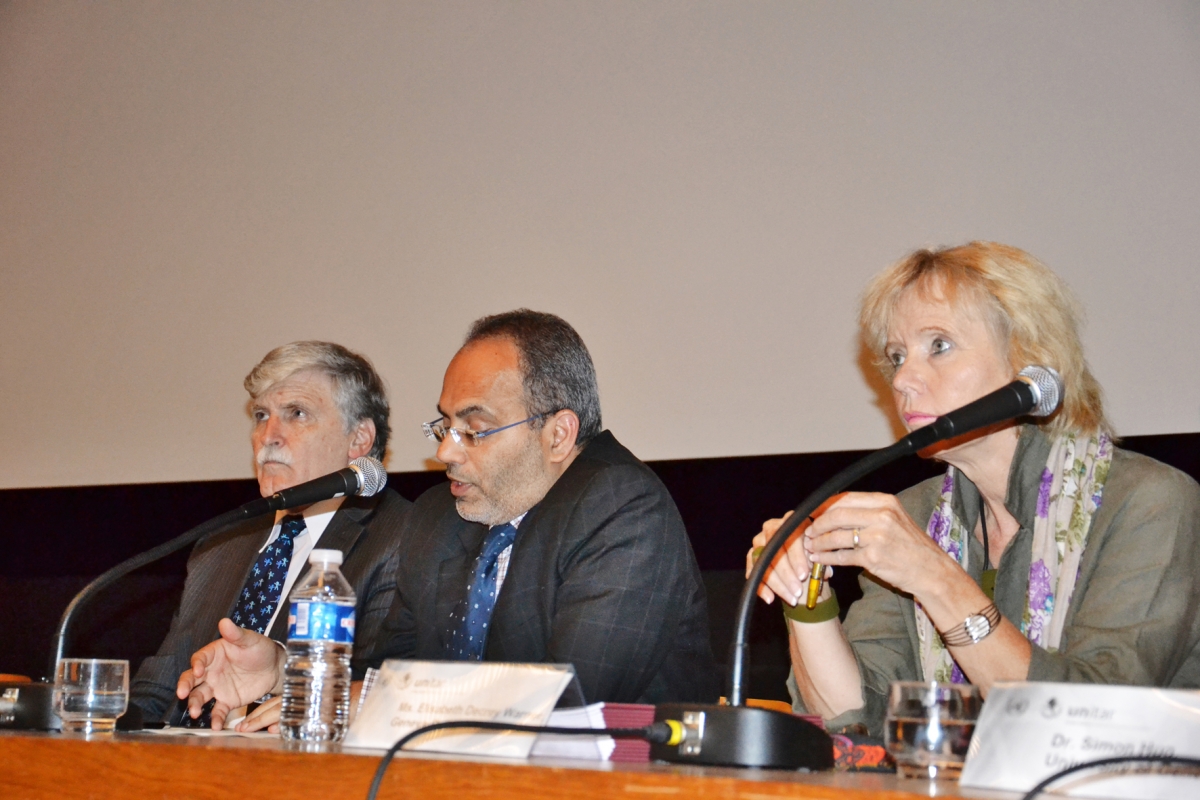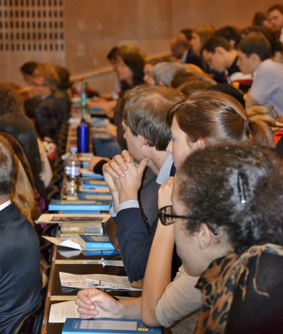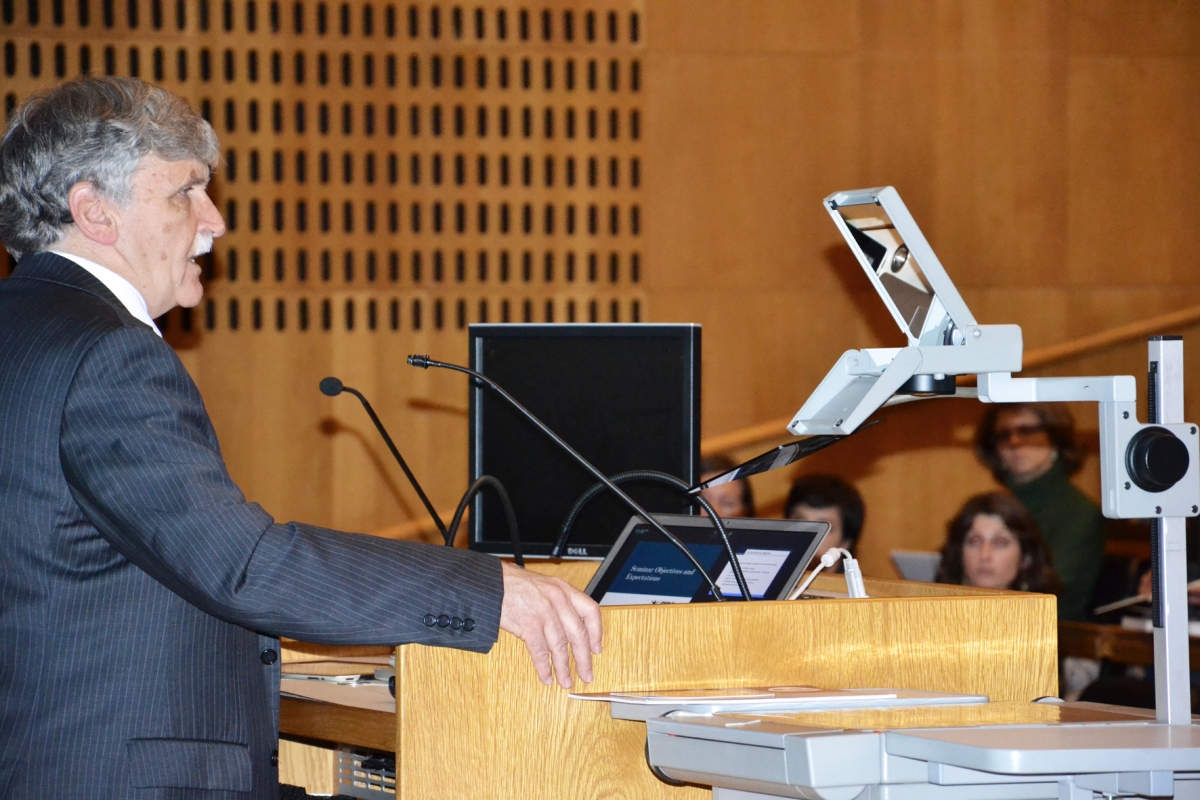 On the occasion of the Third session of the Advisory Board of the UNITAR Peacekeeping Training Programme a well-attended high-level Round Table discussion entitled: “They Fight Like Soldiers, They Die Like Children. Why Child Soldiers need to be on the Security Agenda” based on Lieutenant-General (Ret’d) Roméo Dallaire’s book on Child Soldiers was co-hosted and jointly organised by UNITAR and the University of Geneva in the afternoon of Wednesday 12 October 2011.
On the occasion of the Third session of the Advisory Board of the UNITAR Peacekeeping Training Programme a well-attended high-level Round Table discussion entitled: “They Fight Like Soldiers, They Die Like Children. Why Child Soldiers need to be on the Security Agenda” based on Lieutenant-General (Ret’d) Roméo Dallaire’s book on Child Soldiers was co-hosted and jointly organised by UNITAR and the University of Geneva in the afternoon of Wednesday 12 October 2011.
Ms. Elisabeth Decrey Warner, President and Co-Founder of Geneva Call and Dr. Simon Hug Director, Department of Political Science and International Relations at the University of Geneva joined Senator Dallaire on the panel for a tremendously rich and encouraging discussion.
 The phenomenon of child soldiers is an issue that urgently needs to be addressed as more than 250,000 girls and boys continue to be recruited and used as child soldiers around the world. Children are viewed as cheap and expendable labour and easy to manipulate and control by opportunistic leaders. The Paris Principles define child soldiers as “Any person below 18 years of age who is or who has been recruited or used by an armed force or armed group in any capacity including, but not limited to, children used as fighters, cooks, porters, messengers, spies or for sexual purposes. It does not only refer to a child who is taking or has taken a direct part in hostilities.” (2007)
The phenomenon of child soldiers is an issue that urgently needs to be addressed as more than 250,000 girls and boys continue to be recruited and used as child soldiers around the world. Children are viewed as cheap and expendable labour and easy to manipulate and control by opportunistic leaders. The Paris Principles define child soldiers as “Any person below 18 years of age who is or who has been recruited or used by an armed force or armed group in any capacity including, but not limited to, children used as fighters, cooks, porters, messengers, spies or for sexual purposes. It does not only refer to a child who is taking or has taken a direct part in hostilities.” (2007)
Military and police personnel are often placed on the front lines with little, if any, training on what to expect or how to deal with children being used as soldiers. Yet, the military and police are usually the first point of contact with child soldiers and have an important role to play in preventing their recruitment and use. Recognizing that a child soldier may be used in any of the roles listed above means that the military and police may come into contact, and interact with child soldiers in a multitude of scenarios other than just combat. What should a soldier do when they know an armed group is using children? Or when confronted by a child who is armed? Or when they come across a girl left behind by an armed group?
 In his most recent work, They Fight Like Soldiers, They Die Like Children (2010), Canadian Senator and retired Lieutenant-General Roméo Dallaire (author of Shake Hands with the Devil: The Failure of Humanity in Rwanda and Force Commander of the United Nations Assistance Mission for Rwanda between 1993 and 1994) provides an intellectually daring and enlightening introduction to the child soldier phenomenon, as well as offering inspiring and concrete solutions to eradicate the making, training, and deployment of child soldiers. He enumerates the many reasons why children have become the weapons of choice in conflicts around the world, both by governments and criminal enterprises. The worldwide proliferation of light weapons is partly to blame, as is the sheer plenitude of available recruits: overpopulation has made children a virtually limitless, self-renewing resource; they are cheap to employ and easily replaced. As Dallaire writes, “Child soldiers are a commander's dream come true: the perfect low-technology, cheap and expendable weapon system that can perpetuate itself ad infinitum.”
In his most recent work, They Fight Like Soldiers, They Die Like Children (2010), Canadian Senator and retired Lieutenant-General Roméo Dallaire (author of Shake Hands with the Devil: The Failure of Humanity in Rwanda and Force Commander of the United Nations Assistance Mission for Rwanda between 1993 and 1994) provides an intellectually daring and enlightening introduction to the child soldier phenomenon, as well as offering inspiring and concrete solutions to eradicate the making, training, and deployment of child soldiers. He enumerates the many reasons why children have become the weapons of choice in conflicts around the world, both by governments and criminal enterprises. The worldwide proliferation of light weapons is partly to blame, as is the sheer plenitude of available recruits: overpopulation has made children a virtually limitless, self-renewing resource; they are cheap to employ and easily replaced. As Dallaire writes, “Child soldiers are a commander's dream come true: the perfect low-technology, cheap and expendable weapon system that can perpetuate itself ad infinitum.”
Believing that none of us should tolerate a child being used in this fashion, Dallaire has made it his mission to end the recruitment of child soldiers, founding the Child Soldier Initiative (CSI) and the public mobilization campaign to end child recruitment, known as Zero Force.

